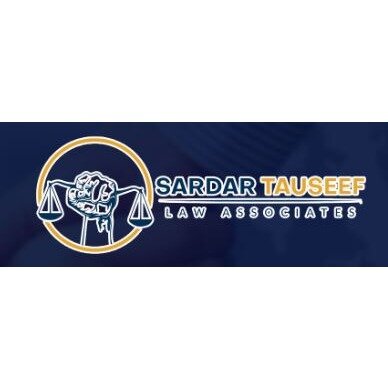Best Art & Cultural Property Law Lawyers in Attock
Share your needs with us, get contacted by law firms.
Free. Takes 2 min.
List of the best lawyers in Attock, Pakistan
About Art & Cultural Property Law in Attock, Pakistan
Art & Cultural Property Law focuses on the protection and regulation of cultural heritage assets, including artworks, historical artifacts, and culturally significant sites. In Attock, Pakistan, this field of law is pivotal due to the region's rich history and its abundance of archaeological sites and cultural artifacts. Local and national laws aim to preserve and protect cultural heritage from illicit trade, vandalism, and unauthorized exportation.
Why You May Need a Lawyer
Individuals and organizations may require legal assistance in Art & Cultural Property Law for several reasons:
- Buying or selling art and artifacts: Ensuring compliance with regulations and determining the provenance and legality of pieces.
- Possession disputes: Resolving legal ownership of a piece of art or cultural property.
- International trade issues: Navigating export/import restrictions and adhering to international treaties on cultural heritage.
- Cultural property restitution: Seeking the return of cultural items to their country or community of origin.
- Intellectual property issues: Dealing with copyright and reproduction rights for artworks.
Local Laws Overview
Attock, like the rest of Pakistan, adheres to national laws and international treaties regarding cultural property. Key legislative frameworks include:
- The Antiquities Act, 1975: Governs the protection of ancient monuments and archaeological sites, outlining the legalities around the ownership, excavation, and protection of antiquities.
- The Cultural Heritage (Protection) Act: Provides measures for preserving cultural sites and prohibits unauthorized alterations.
- UNESCO Convention: Pakistan is a signatory, committing to the protection of cultural heritage and prevention of illicit trafficking.
Local authorities in Attock also issue specific guidelines and regulations supporting the national framework, particularly due to the area's historical significance.
Frequently Asked Questions
What qualifies as cultural property?
Cultural property includes artifacts, artworks, monuments, and historical sites that are of significance to a culture, religion, or community.
Can I legally purchase antiquities in Attock?
Purchasing antiquities requires verifying their provenance and ensuring compliance with the Antiquities Act and other related laws to avoid illegal trade and possession.
How can I verify the authenticity of an artwork?
Consulting experts and conducting provenance research are crucial steps. Legal professionals can assist in verifying authenticity through documentation and legal checks.
What should I do if I discover an artifact on my property?
Report the find to local authorities as required by law, as undisclosed discoveries can lead to legal complications under national antiquities regulations.
Are there export restrictions on cultural property?
Yes, strict regulations govern the export of cultural property, requiring permits and adherence to both national laws and international agreements.
What is restitution in cultural property law?
Restitution involves returning cultural items to their country or community of origin, often requiring legal action to address unlawful possession or removal.
How do I protect my artwork from copyright infringement?
Registering for copyright protection and consulting a lawyer for best practices on licensing and enforcement can safeguard your rights.
What international laws apply to cultural property in Pakistan?
Pertinent international laws include the UNESCO Convention on the Means of Prohibiting and Preventing the Illicit Import, Export and Transfer of Ownership of Cultural Property 1970.
Who is responsible for cultural property law enforcement in Attock?
Local heritage departments, in coordination with federal bodies like the Department of Archaeology and Museums, are tasked with enforcing cultural property laws.
What penalties exist for violating cultural property laws?
Penalties include fines, imprisonment, and confiscation of items involved in violations related to illegal excavation, trade, or export of cultural properties.
Additional Resources
Consider consulting the following resources:
- Department of Archaeology and Museums, Pakistan: Offers guidance on national heritage and artifacts.
- UNESCO Pakistan office: Provides information on international cultural property conventions.
- Local heritage offices in Attock: Can assist with region-specific inquiries and compliance.
Next Steps
If you need legal assistance in Art & Cultural Property Law in Attock, consider the following steps:
- Consult an experienced lawyer specializing in cultural property law for guidance.
- Collect all relevant documentation, including provenance records and permits.
- Reach out to local cultural heritage authorities for site-specific regulations and support.
- If facing a legal dispute, prepare by understanding both local and international legal frameworks affecting your case.
Remember, early legal intervention can often prevent costly disputes and ensure compliance with intricate laws protecting cultural heritage.
Lawzana helps you find the best lawyers and law firms in Attock through a curated and pre-screened list of qualified legal professionals. Our platform offers rankings and detailed profiles of attorneys and law firms, allowing you to compare based on practice areas, including Art & Cultural Property Law, experience, and client feedback.
Each profile includes a description of the firm's areas of practice, client reviews, team members and partners, year of establishment, spoken languages, office locations, contact information, social media presence, and any published articles or resources. Most firms on our platform speak English and are experienced in both local and international legal matters.
Get a quote from top-rated law firms in Attock, Pakistan — quickly, securely, and without unnecessary hassle.
Disclaimer:
The information provided on this page is for general informational purposes only and does not constitute legal advice. While we strive to ensure the accuracy and relevance of the content, legal information may change over time, and interpretations of the law can vary. You should always consult with a qualified legal professional for advice specific to your situation.
We disclaim all liability for actions taken or not taken based on the content of this page. If you believe any information is incorrect or outdated, please contact us, and we will review and update it where appropriate.








